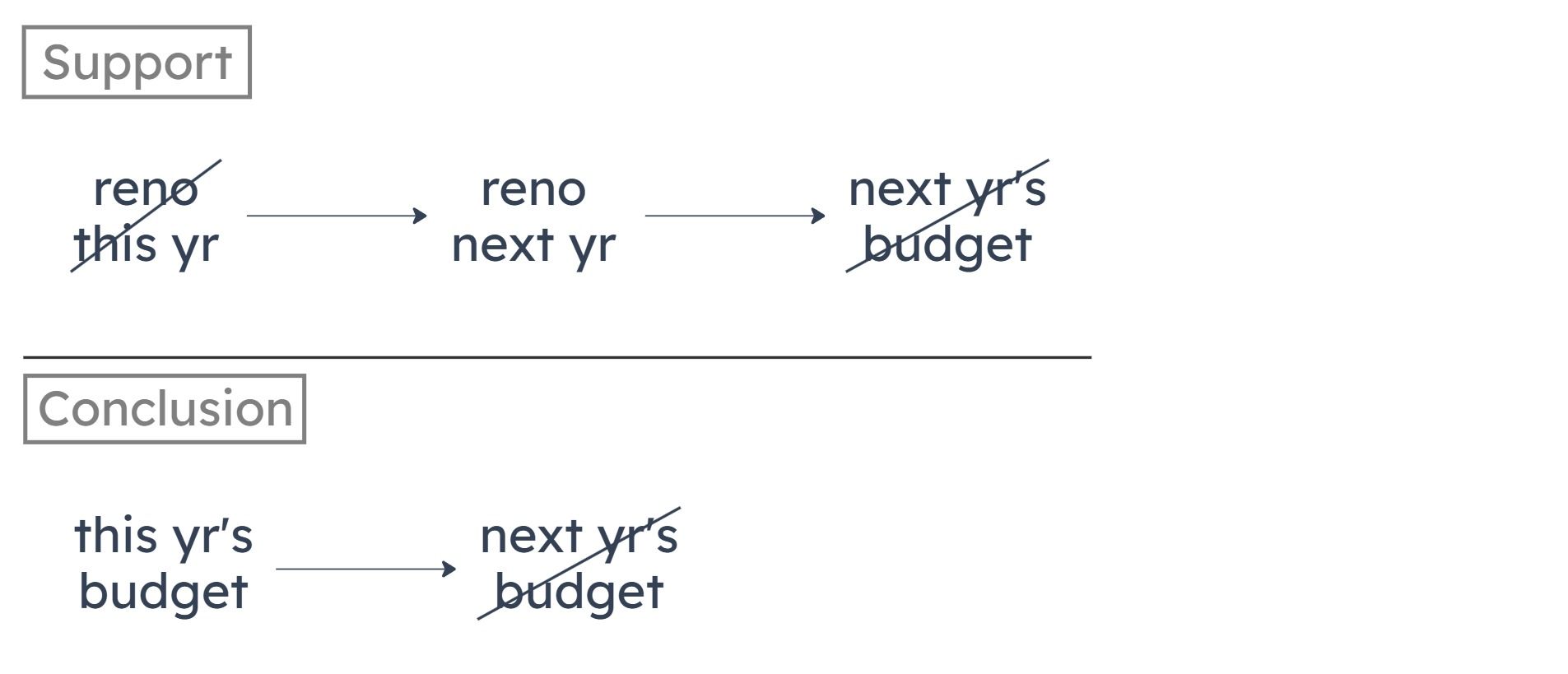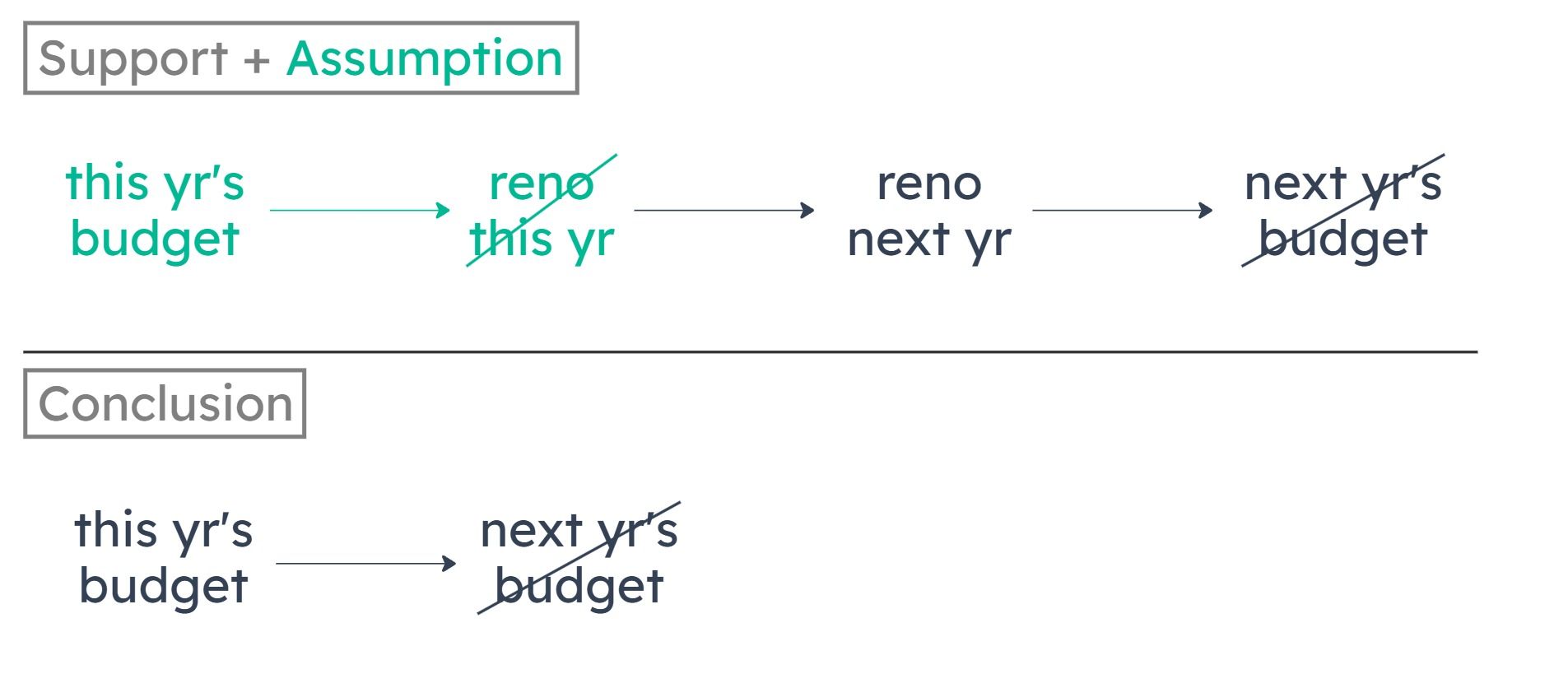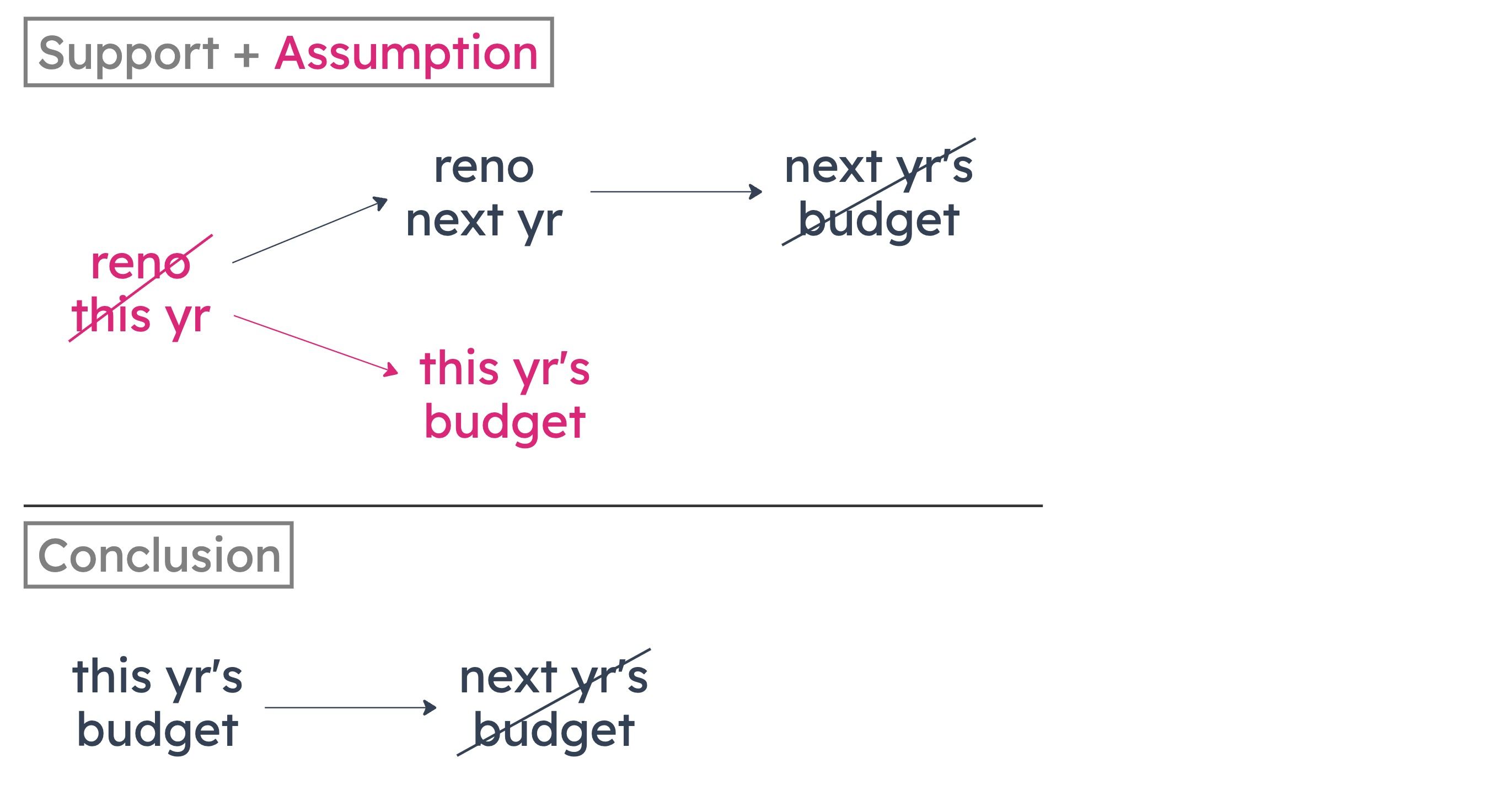LSAT 156 – Section 4 – Question 13
LSAT 156 - Section 4 - Question 13
July 2020You need a full course to see this video. Enroll now and get started in less than a minute.
Target time: 1:26
This is question data from the 7Sage LSAT Scorer. You can score your LSATs, track your results, and analyze your performance with pretty charts and vital statistics - all with a Free Account ← sign up in less than 10 seconds
| Question QuickView |
Type | Tags | Answer Choices |
Curve | Question Difficulty |
Psg/Game/S Difficulty |
Explanation |
|---|---|---|---|---|---|---|---|
| PT156 S4 Q13 |
+LR
| Sufficient assumption +SA | A
8%
149
B
6%
147
C
4%
151
D
43%
160
E
39%
156
|
143 162 180 |
+Hardest | 147.09 +SubsectionMedium |
Summary
If the museum stays within this year’s budget, it won’t stay within next year’s budget. To support this conclusion, we’re given two conditional premises:
(1) If the museum doesn’t renovate this year, it must renovate next year.
(2) If the museum renovates next year, it won’t stay within next year’s budget.

(1) If the museum doesn’t renovate this year, it must renovate next year.
(2) If the museum renovates next year, it won’t stay within next year’s budget.

Missing Connection
The conclusion is a conditional claim involving this year’s budget, but this year’s budget doesn’t appear anywhere in the premises. Rather, the premises are all about how renovations will affect next year’s budget. So the correct answer must connect this year’s budget to those premises.
Specifically, we can reach the author’s conclusion if we assume that to stay within this year’s budget, the museum must not renovate this year. (Contrapositive: If the museum renovates this year, it must not stay within this year’s budget.)
Specifically, we can reach the author’s conclusion if we assume that to stay within this year’s budget, the museum must not renovate this year. (Contrapositive: If the museum renovates this year, it must not stay within this year’s budget.)
A
The museum will stay within this year’s budget.
This fails to show that this year’s budget affects next year’s. Because the premises don’t raise the subject of this year’s budget, staying within that budget has no effect on the argument. We still have no reason to think this year’s budget has any impact on next year’s.
B
This year’s budget is less than next year’s budget.
This compares the two budgets but fails to show that this year’s has any effect on next year’s. Because the premises don’t raise the subject of this year’s budget in any way, the relative value of that budget has no effect on the argument.
C
The museum will not renovate next year.
This fails to introduce this year’s budget to the argument. Even if we assume (C), the premises remain completely silent on the subject of this year’s budget. So we’re given no reason to think that this year’s budget has any effect on renovations or to next year’s budget.
D
The museum will exceed this year’s budget if it renovates this year.
Contrapositive: if the museum doesn’t exceed this year’s budget (i.e., if it stays within budget), it must not renovate this year. And from the premises, if the museum doesn’t renovate this year, it must renovate next year, meaning it won’t stay within next year’s budget.


E
The museum will stay within this year’s budget if it does not renovate this year.
This gets the sufficient and necessary conditions reversed. To reach the conclusion, we want an assumption that makes staying within this year’s budget sufficient for exceeding next year’s. But according to (E), staying within this year’s budget isn’t sufficient for anything.


Take PrepTest
Review Results
LSAT PrepTest 156 Explanations
Section 1 - Reading Comprehension
- Passage 1 – Passage
- Passage 1 – Questions
- Passage 2 – Passage
- Passage 2 – Questions
- Passage 3 – Passage
- Passage 3 – Questions
- Passage 4 – Passage
- Passage 4 – Questions
Section 2 - Logical Reasoning
- Question 01
- Question 02
- Question 03
- Question 04
- Question 05
- Question 06
- Question 07
- Question 08
- Question 09
- Question 10
- Question 11
- Question 12
- Question 13
- Question 14
- Question 15
- Question 16
- Question 17
- Question 18
- Question 19
- Question 20
- Question 21
- Question 22
- Question 23
- Question 24
- Question 25
Section 3 - Reading Comprehension
- Passage 1 – Passage
- Passage 1 – Questions
- Passage 2 – Passage
- Passage 2 – Questions
- Passage 3 – Passage
- Passage 3 – Questions
- Passage 4 – Passage
- Passage 4 – Questions
Section 4 - Logical Reasoning
- Question 01
- Question 02
- Question 03
- Question 04
- Question 05
- Question 06
- Question 07
- Question 08
- Question 09
- Question 10
- Question 11
- Question 12
- Question 13
- Question 14
- Question 15
- Question 16
- Question 17
- Question 18
- Question 19
- Question 20
- Question 21
- Question 22
- Question 23
- Question 24
- Question 25
- Question 26
Leave a Reply
You must be logged in to post a comment. You can get a free account here.